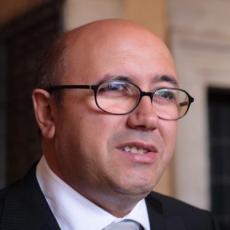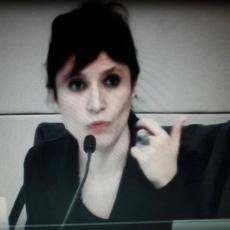Objectives
Objectives information not yet available.
Channels
 ALESSANDRO SANZO Teacher profile
ALESSANDRO SANZO Teacher profile
Adopted texts
Study bibliography on which the General and Social Pedagogy exam will focus
Handout n.1 of General and Social Pedagogy written by Prof. Cerrocchi (with reference to her essays in volumes from 2002 to 2022)
2. A. Caschera – S. Savino, Educating for health. Manual of general and social pedagogy for the health professions, Rome, SaMa Edizioni, 2020, limited to chapters 3 and 4, pp. 57-107
3. Handout n.2 of General and Social Pedagogy assembled by Prof. Cerrocchi (with
reference to his essays in volumes of 2005; 2014; 2018; 2021; 2022)
NB. Both handouts referring to lessons by Prof. Cerrocchi will be published on the Classroom page of the General and Social Pedagogy course, from which they are downloadable for students, together with the Power Point referable to his second dispensation.
On the same page there will be the Power Point referable to the lessons of Prof. Sanzo.
NB. Please note that in order to pass the General and Social Pedagogy exam, it is necessary to study both lecture notes by Prof. Cerrocchi together with that of the bibliographic material indicated by Prof. Sanzo. In fact, the mere reading of power points cannot in any way correspond to adequate preparation for the exam.
Reference bibliography
Frabboni F., Pinto Minerva F. (1994), Manuale di pedagogia generale, Laterza, Bari.
Cerrocchi L., Dozza L. (a cura di) (2018), Contesti educativi per il sociale. Progettualità, professioni e setting per il benessere individuale e di comunità, Franco Angeli, Milano.
Cerrocchi L. (2022), La relazione educativa in contesti di emergenza. Analisi e messa a punto del setting pedagogico. In Annacontini G., Vaccarelli A., Zizioli E. (a cura di), Sesto atto. Prospettive per una Pedagogia dell’Emergenza, Progedit – Progetti editoriali srl, pp.24-34.
Marzi V. (2014), Pedagogia e progetto educativo. Per infermieri e professioni sanitarie, Universitalia, Roma.
Prerequisites
Not are required specific entry prerequisites : the teaching is basic.
Study modes
"General and social pedagogy" module (2 CFU) will be carried out by Prof. Cerrocchi (who will hold 5 lessons) and by Prof. Sanzo (who will hold 5 lessons). Frontal and interactive teaching. Lessons, individual and group study itineraries, eventual presentation of materials by students
Frequency modes
Attendance at lessons is face-to-face and compulsory according to the regulations of the Study Programme.
Exam modes
To pass the exam it is necessary to obtain a grade of not less than 18/30 in each module.
The exam will be in written form and will focus on the bibliographic material of the module indicated by the teachers. The exam consists of six multiple-choice questions (each of three points – 3/30) and two open questions (each of six points – 6/30).
In evaluating the test, there are following general indexes of judgment: a) for questions with multiple choice answers, the accuracy of the answer will be taken into account; b) for open questions, instead, account will be taken of the mastery and conceptual organization of the thematic contents, of the thematic breadth and coherence of the discussion, of the specialist lexical correctness, of the level of detail and ability to connect theoretically, of the ability to re-elaborate criticism of knowledge, of the ability to infer theoretical knowledge from the operational plan in a professional context.
 LAURA CERROCCHI Teacher profile
LAURA CERROCCHI Teacher profile
Programme
General and social pedagogy" (2 CFU), as part of the integrated exam "Socio-psycho-pedagogical sciences" (6 CFU), focuses on:
1. knowledge about study and action object of pedagogy as theoretical-practical knowledge (trinomial teaching-education-bildung and multidimensional/integral bildung of the subject-person as a transaction between a bio-psychological subject in a cognitive and affective sense , society and culture ), education at all ages (childhood, adolescence, youth, adults and the elderly) and contexts (physical, social and cultural) of life in lifelong education and integrated educative system and/or services network;
2. elements of reflection on the nature and purpose of Pedagogy as a human science and complex and systemic knowledge, connector of educational sciences;
3. elements of analysis and set of the setting of the educational aid/care relationship and of communication in the field of study and action of the health-rehabilitative professions, to guide future professionals in recognizing, clarifying and substantiating the educational values of healthcare work, with reference to: relationship models between healthcare professional and patient; health, health promotion, health education; care vs cure, body and mind, transversal skills, helping relationship, phases of the educational relationship, empowerment, resilience; information, communication and active listening; planning and evaluation of a care action in its educational potential; reciprocity between social representations, self-perception system, sense of self-efficacy and agency and people's real conditions: implications, strategies and potential of care work; conflict and/or anti-group dynamics/phenomena, economistic and fusional deviations in group management and group as a working method; analysis and set of care relationship setting in an educational perspective; affective life and paths of intelligence, human/educational communication, training - initial and in service - and cultural and professional growth: processes and practices of Adult Education.
Adopted texts
Study bibliography on which the General and Social Pedagogy exam will focus
Handout n.1 of General and Social Pedagogy written by Prof. Cerrocchi (with reference to her essays in volumes from 2002 to 2022)
2. A. Caschera – S. Savino, Educating for health. Manual of general and social pedagogy for the health professions, Rome, SaMaEdizioni, 2020, limited to chapters 3 and 4, pp. 57-107
3. Handout n.2 of General and Social Pedagogy assembled by Prof. Cerrocchi (with
reference to his essays in volumes of 2005; 2014; 2018; 2021; 2022)
NB. Both handouts referring to lessons by Prof. Cerrocchi will be published on the Classroom page of the General and Social Pedagogy course, from which they are downloadable for students, together with the Power Point referable to his second dispensation.
On the same page there will be the Power Point referable to the lessons of Prof. Sanzo.
NB. Please note that in order to pass the General and Social Pedagogy exam, it is necessary to study both lecture notes by Prof. Cerrocchi together with that of the bibliographic material indicated by Prof. Sanzo. In fact, the mere reading of power points cannot in any way correspond to adequate preparation for the exam.
Bibliography
Reference bibliography Frabboni F., Pinto Minerva F. (1994), Manuale di pedagogia generale, Laterza, Bari. Cerrocchi L., Dozza L. (a cura di) (2018), Contesti educativi per il sociale. Progettualità, professioni e setting per il benessere individuale e di comunità, Franco Angeli, Milano. Cerrocchi L. (2022), La relazione educativa in contesti di emergenza. Analisi e messa a punto del setting pedagogico. In Annacontini G., Vaccarelli A., Zizioli E. (a cura di),Sesto atto. Prospettive per una Pedagogia dell’Emergenza, Progedit – Progetti editoriali srl, pp.24-34. Marzi V. (2014), Pedagogia e progetto educativo. Per infermieri e professioni sanitarie, Universitalia, Roma.
Prerequisites
Not are required specific entry prerequisites : the teaching is basic.
Study modes
"General and social pedagogy" module (2 CFU) will be carried out by Prof. Cerrocchi (who will hold 5 lessons) and by Prof. Sanzo (who will hold 5 lessons). Frontal and interactive teaching. Lessons, individual and group study itineraries, eventual presentation of materials by students
Frequency modes
Attendance at lessons is face-to-face and compulsory according to the regulations of the Study Programme.
Exam modes
To pass the exam it is necessary to obtain a grade of not less than 18/30 in each module.
The exam will be in written form and will focus on the bibliographic material of the module indicated by the teachers. The exam consists of six multiple-choice questions (each of three points – 3/30) and two open questions (each of six points – 6/30).
In evaluating the test, there are following general indexes of judgment: a) for questions with multiple choice answers, the accuracy of the answer will be taken into account; b) for open questions, instead, account will be taken of the mastery and conceptual organization of the thematic contents, of the thematic breadth and coherence of the discussion, of the specialist lexical correctness, of the level of detail and ability to connect theoretically, of the ability to re-elaborate criticism of knowledge, of the ability to infer theoretical knowledge from the operational plan in a professional context.
- Academic year: 2023/2024
- Curriculum: Curriculum unico
- Year: First year
- Semester: First semester
- Parent course:
1034831 - SOCIO-PSYCHO-PEDAGOGICAL SCIENCES - SSD: M-PED/01
- CFU: 2
- Attività formative di base
- Ambito disciplinare: Scienze propedeutiche
- Lecture (Hours): 20
- CFU: 2
- SSD: M-PED/01
